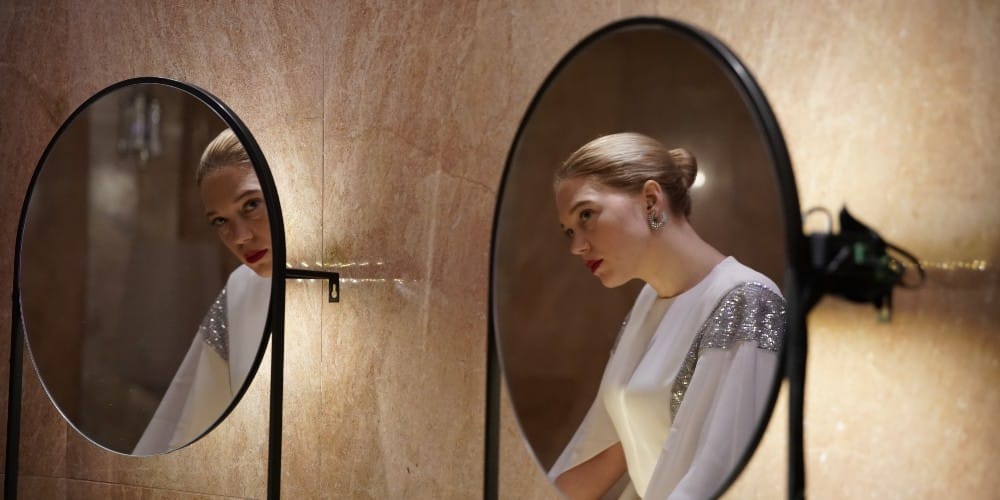Director Bruno Dumont’s satire is sharp and funny but fails to examine itself for the very biases it wants to challenge.
In medieval morality plays, the dramatis personae always includes the likes of Charity, Death, and Temperance, named for the vices or virtues they embody. These characters are vessels, existing somewhere between allegory and literalism and imbued with the social values and anxieties of their time. French surrealist Bruno Dumont (Lil Quinquin, Slack Bay) drags this tradition into the twenty-first century with his latest film, France.
France de Meurs (Léa Seydoux) is France-the-nation’s premier journalist. Renowned across the country for her bold yet compassionate perspective, she is the people’s darling, the one they put their trust in. Between the edits though, France is more interested in provocation and making good TV than she is in getting answers or justice. But when a freak accident causes a small crack in her artifice, it sets the stage for her total collapse.

The allegory clicks immediately. The self-conscious filming of France producing her segments brilliantly satirizes the facade fabricated by the media to tell sensational stories. France watches France interview French-backed insurgents fighting ISIS, gather B-roll footage, and splice together a story that is more about France (both the nation and the journalist) than it’s about the fighters on the ground.
By the time the final product is aired in the studio, the picture has made clear how each layer of France’s performance is constructed on top of each other, creating the tangible sense of ironic distrust Dumont is seeking.
This succeeds primarily thanks to the compelling work of Léa Seydoux. As a character and a nation, France continually boils over with emotion. Thus, Seydoux churns France’s emotions beneath the surface. She’s cheeky with best friend/assistant Lou (Blanche Gardin) one moment, asks tough questions of President Macron the next, and hops back to jokes which are followed immediately by a disaffected fugue state.
Through calculated holds, glances, and gestures, Seydoux showcases the architecture of France’s interior life.
Seydoux’s work is consummately professional. She understands how to play the difficult deadpan humor Dumont is known for. Indeed, her banter with Lou makes for some of the most delicious moments in the movie. But it’s when France starts to fall apart that Seydoux’s mastery of her craft and this role become truly apparent. As France de Meurs becomes tangled in her web of performance, Seydoux makes her polished veneer slip right before the audience’s eyes.
France’s eyes well—but are her tears real or fake? Does she even know? Seydoux digs into France’s trying to work that out. Through calculated holds, glances, and gestures, Seydoux showcases the architecture of France’s interior life. This doesn’t just make for a formidable foundation for her character, it’s a tool she uses to showcase new layers peeling off of France as the film progresses.

Seydoux’s work is particularly impressive given that for all his brilliant aim and concepts, Dumont casts his line out a bit too far between each recoil. While some tension needs to be let out so that emotions can snap back, Dumont frequently leaves the audience drifting to the point that the picture’s thread gets lost.
Dumont’s conception of French media hypocrisy is strong. But he’s doing iterative rather than groundbreaking work, so the massive number of examples Dumont provides of that hypocrisy ultimately prove counterproductive. Oui, France is disaffected. Oui, she constructs messages and ideologies hypocritical. Et alors?

Furthermore, the moves France-the-moviemakes to prove a greater point about France’s political duplicity come at the expense of the racial others portrayed in the film. Dumont may have set out to say something about France’s colonial and faux-benevolent treatment of Arabic people and political refugees, but in practice, the colonizer is the only one who speaks and retains the focus.
Calling attention to racially constructed narratives does little when the objects of those narratives remain obscured and silenced. France ultimately repeats the same sour colonial narrative it seeks to critique—leaving the racial others in its cast objects of spectacle whose only function is to reaffirm White humanity.
France is a lot to take in. It boasts a brilliant concept, a cataclysmic ending, Alexandra Charles’ impeccable wardrobe stylings, and Seydoux’s exquisite performance. But, examining the narrative being assembled—just as France asks viewers to do when engaging with national media—makes its own gaps and failings become clear. France fails to successfully overturn its own prejudices despite the enlightened ideals it aspires to, much like the nation it holds under a lens.
France arrives in theaters on December 10, 2021.
France Trailer:
Read next: The Spool's Best New Releases
Streaming guides
The Best Live TV Streaming Services With Free Trial
The praises of live TV streaming services don’t need to be further sung. By now, we all know that compared to clunky, commitment-heavy cable, live TV is cheaper and much easier to manage. But just in case you’re still on the fence about jumping over to the other side, or if you’re just unhappy with ... The Best Live TV Streaming Services With Free Trial
How to Watch Power Book III: Raising Kanan Season 3
Season 3 of the hotly anticipated Power spin-off, Power Book III: Raising Kanan, is arriving on Starz soon, so you know what that means: it’s the ’90s again in The Southside, and we’re back with the Thomas family as they navigate the ins and outs of the criminal underworld they’re helping build. Mekai Curtis is ... How to Watch Power Book III: Raising Kanan Season 3
How to Watch Doctor Who: 60th Anniversary Specials
Ladies and gentlemen, we’re so back! To celebrate Doctor Who’s 60th anniversary, the BBC is producing a three-episode special starring none other than the Tenth/Fourteenth Doctor himself, David Tennant. And to the supreme delight of fans (that would be me, dear reader), the Doctor will be joined by old-time companion Donna Noble (Catherine Tate) and ... How to Watch Doctor Who: 60th Anniversary Specials
Which Netflix Country has Interstellar?
Maybe you’ve just seen Oppenheimer and have the strongest urge to marathon—or more fun yet, rank!—all of Christopher Nolan’s films. Or maybe you’re one of the few who haven’t seen Interstellar yet. If you are, then you should change that immediately; the dystopian epic is one of Nolan’s best, and with that incredible twist in ... Which Netflix Country has Interstellar?
Which Netflix Country Has Each Movie of The Hunger Games?
For whatever reason, The Hunger Games series isn’t available in the same countries around the world. You’ll find the first and second (aka the best) installments in Hong Kong, for instance, but not the third and fourth. It’s a frustrating dilemma, especially if you don’t even have a single entry in your region, which is ... Which Netflix Country Has Each Movie of The Hunger Games?
How to Watch ESPN With A Free Trial
One of the major concerns people have before cutting the cord is potentially losing access to live sports. But the great thing about live TV streaming services is that you never lose that access. Minus the contracts and complications of cable, these streaming services connect you to a host of live channels, including ESPN. So ... How to Watch ESPN With A Free Trial
How to Watch Paramount Network With a Free Trial
To date, Paramount Network has only two original shows on air right now: Yellowstone and Bar Rescue. The network seems to have its hands full with on-demand streaming service Paramount+, which is constantly stacked with a fresh supply of new shows. But Yellowstone and Bar Rescue are so sturdy and expansive that the network doesn’t ... How to Watch Paramount Network With a Free Trial
How to Watch WE TV With a Free Trial
Previously “Women’s Entertainment,” We TV has since rebranded to accurately reflect its name and be a more inclusive lifestyle channel. It’s home to addictive reality gems like Bold and Bougie, Bridezillas, Marriage Boot Camp, and The Untold Stories of Hip Hop. And when it’s not airing original titles, it has on syndicated shows like 9-1-1, ... How to Watch WE TV With a Free Trial
How to Watch TNT Sports With A Free Trial
For many sports fans, TNT is a non-negotiable. It broadcasts NBA, MLB, NHL, college basketball, and All Elite Wrestling matches. And, as a bonus, it also has reruns of shows like Supernatural, Charmed, and NCIS, as well as films like The Avengers, Dune, and Justice League. But while TNT used to be a cable staple, ... How to Watch TNT Sports With A Free Trial
How to Watch Comedy Central With a Free Trial
It’s no coincidence that many of today’s biggest comedians found their footing on Comedy Central: the channel is a bastion of emerging comic talents. It served as a playground for people like Nathan Fielder (Fielder For You), Ilana Glazer and Abbi Jacobson (Broad City), Tim Robinson (Detroiters), and Dave Chappelle (Chappelle’s Show) before they shot ... How to Watch Comedy Central With a Free Trial
How to Watch FX With a Free Trial
You’d be hard-pressed to find a bad show airing on FX. The channel has made a name for itself as a bastion of high-brow TV, along with HBO and AMC. It’s produced shows like Atlanta, Fargo, The Americans, Archer, and more recently, Shogun. But because it’s owned by Disney, it still airs several blockbusters in ... How to Watch FX With a Free Trial